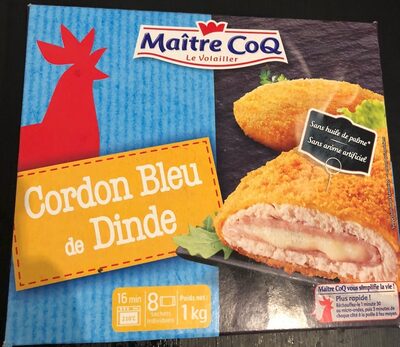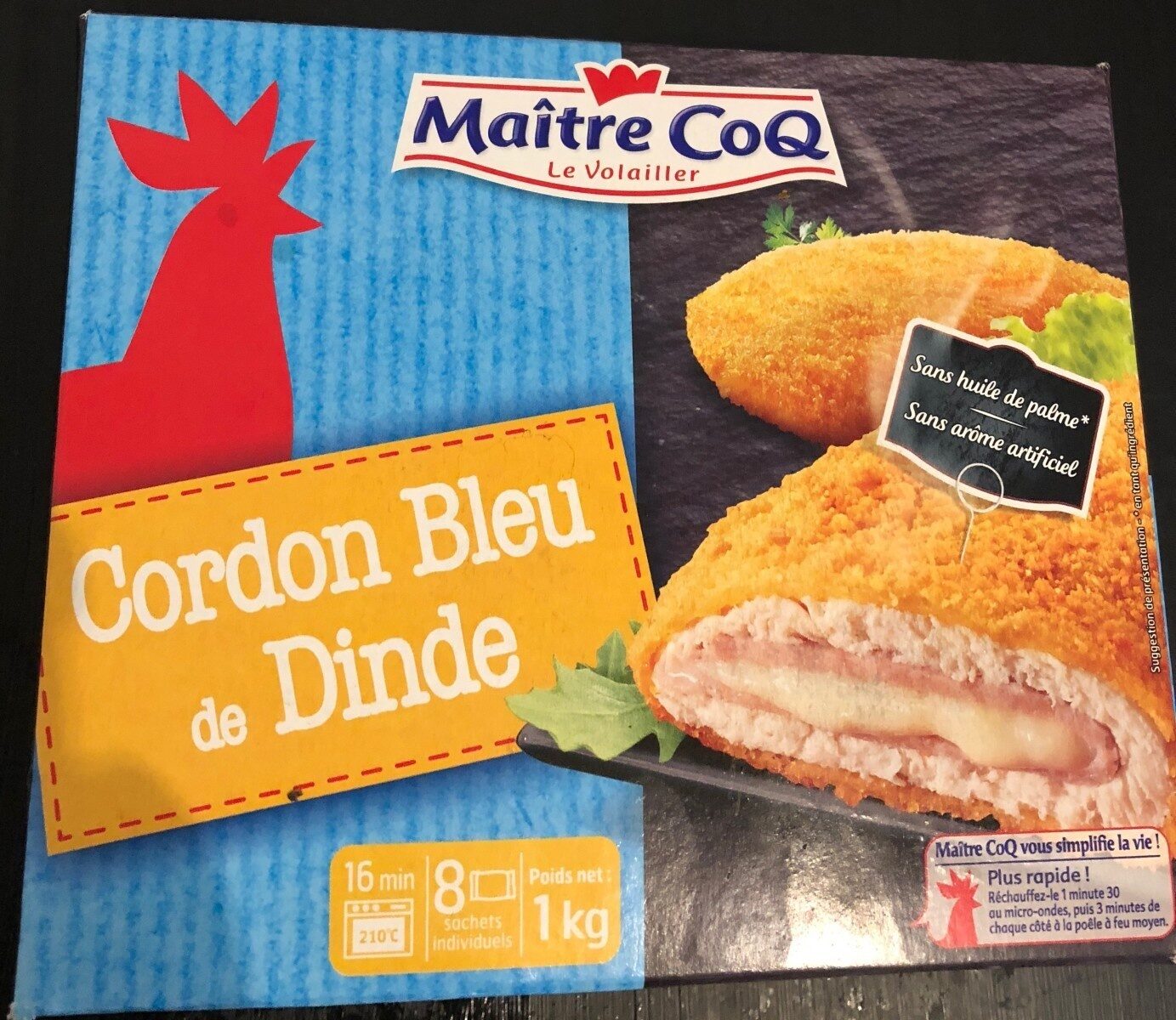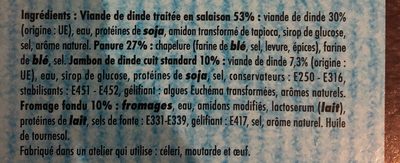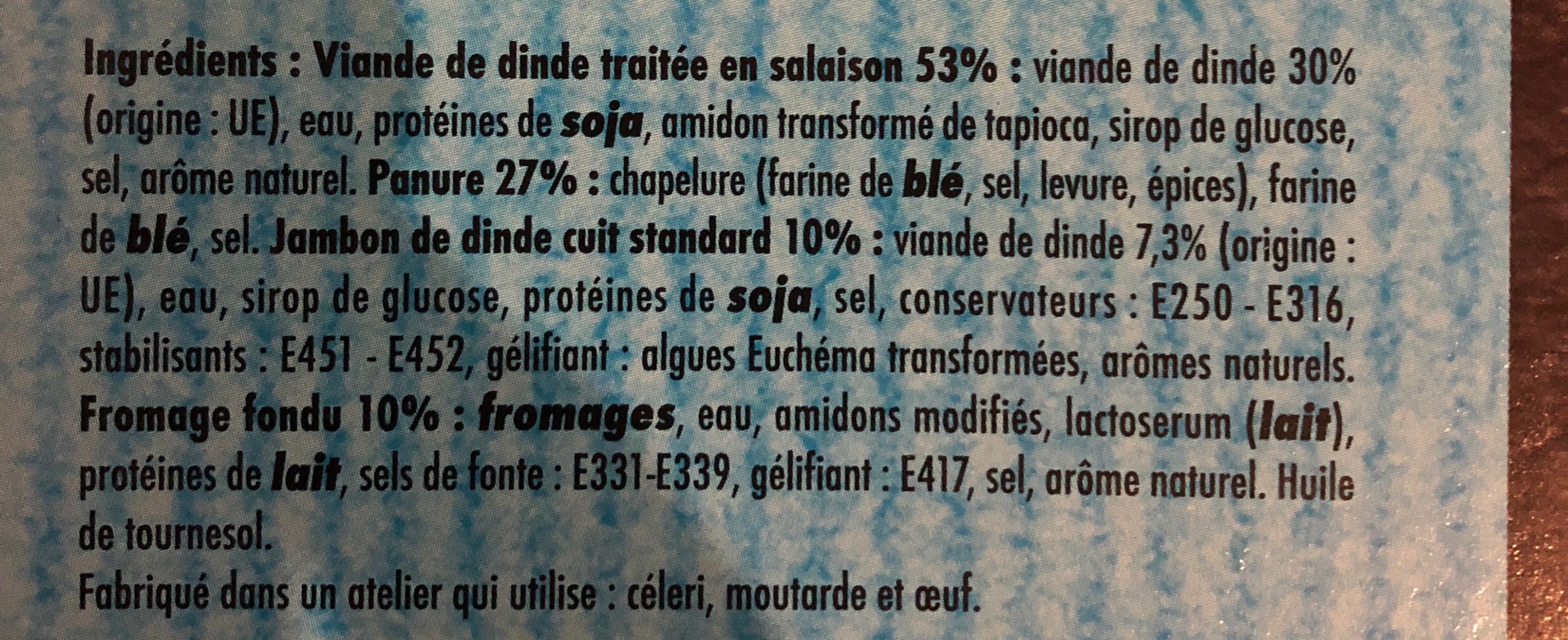Help us make food transparency the norm!
As a non-profit organization, we depend on your donations to continue informing consumers around the world about what they eat.
The food revolution starts with you!
Cordon bleu de dinde - Maitre Coq - 1 kg
Cordon bleu de dinde - Maitre Coq - 1 kg
This product page is not complete. You can help to complete it by editing it and adding more data from the photos we have, or by taking more photos using the app for Android or iPhone/iPad. Thank you!
×
Barcode: 3230890016431 (EAN / EAN-13)
Quantity: 1 kg
Brands: Maitre Coq
Categories: Meats and their products, Meat preparations, Turkey and its products, Breaded products, Turkey preparations, Cordons bleus, Turkey cordons bleus
Labels, certifications, awards: No artificial flavors, No palm oil
Countries where sold: France
Matching with your preferences
Health
Ingredients
-
47 ingredients
: Viande de dinde traitée en salaison 53% : viande de dinde 30% (origine: UE), eau, protéines de soja, amidon transformé de tapioca, sirop de glucose, sel, arôme naturel. Panure 27%: chapelure (farine de blé, sel, levure, épices), farine de blé, sel. Jambon de dinde cuit standard 10%: viande de dinde 7,3% (origine : UE), eau, sirop de glucose, protéines de soja, sel, conservateurs : E250 - E316, stabilisants : E451 - E452, gélifiant : algues Euchéma transformées, arômes naturels. Fromage fondu 10%: fromages, eau, amidons modifiés, lactoserum (lait), protéines de lait, sels de fonte: E331-E339, gélifiant : E417, sel, arôme naturel. Huile de tournesol.Allergens: Gluten, Milk, Soybeans
Food processing
-
Ultra processed foods
Elements that indicate the product is in the 4 - Ultra processed food and drink products group:
- Additive: E14XX - Modified Starch
- Additive: E407a - Processed eucheuma seaweed
- Additive: E417 - Tara gum
- Additive: E451 - Triphosphates
- Additive: E452 - Polyphosphates
- Ingredient: Flavouring
- Ingredient: Gelling agent
- Ingredient: Glucose
- Ingredient: Glucose syrup
- Ingredient: Milk proteins
- Ingredient: Whey
Food products are classified into 4 groups according to their degree of processing:
- Unprocessed or minimally processed foods
- Processed culinary ingredients
- Processed foods
- Ultra processed foods
The determination of the group is based on the category of the product and on the ingredients it contains.
Additives
-
E250 - Sodium nitrite
Sodium nitrite: Sodium nitrite is the inorganic compound with the chemical formula NaNO2. It is a white to slightly yellowish crystalline powder that is very soluble in water and is hygroscopic. It is a useful precursor to a variety of organic compounds, such as pharmaceuticals, dyes, and pesticides, but it is probably best known as a food additive to prevent botulism. It is on the World Health Organization's List of Essential Medicines, the most important medications needed in a basic health system.Nitrate or nitrite -ingested- under conditions that result in endogenous nitrosation has been classified as "probably carcinogenic to humans" by International Agency for Research on Cancer -IARC-.Source: Wikipedia
-
E316 - Sodium erythorbate
Sodium erythorbate: Sodium erythorbate -C6H7NaO6- is a food additive used predominantly in meats, poultry, and soft drinks. Chemically, it is the sodium salt of erythorbic acid. When used in processed meat such as hot dogs and beef sticks, it increases the rate at which nitrite reduces to nitric oxide, thus facilitating a faster cure and retaining the pink coloring. As an antioxidant structurally related to vitamin C, it helps improve flavor stability and prevents the formation of carcinogenic nitrosamines. When used as a food additive, its E number is E316. The use of erythorbic acid and sodium erythorbate as a food preservative has increased greatly since the U.S. Food and Drug Administration banned the use of sulfites as preservatives in foods intended to be eaten fresh -such as ingredients for fresh salads- and as food processors have responded to the fact that some people are allergic to sulfites. It can also be found in bologna, and is occasionally used in beverages, baked goods, and potato salad.Sodium erythorbate is produced from sugars derived from different sources, such as beets, sugar cane, and corn. An urban myth claims that sodium erythorbate is made from ground earthworms; however, there is no truth to the myth. It is thought that the genesis of the legend comes from the similarity of the chemical name to the words earthworm and bait.Alternative applications include the development of additives that could be utilized as anti-oxidants in general. For instance, this substance has been implemented in the development of corrosion inhibitors for metals and it has been implemented in active packaging.Sodium erythorbate is soluble in water. The pH of the aqueous solution of the sodium salt is between 5 and 6. A 10% solution, made from commercial grade sodium erythorbate, may have a pH of 7.2 to 7.9. In its dry, crystalline state it is nonreactive. But, when in solution with water it readily reacts with atmospheric oxygen and other oxidizing agents, which makes it a valuable antioxidant.Source: Wikipedia
-
E331 - Sodium citrates
Sodium citrate: Sodium citrate may refer to any of the sodium salts of citrate -though most commonly the third-: Monosodium citrate Disodium citrate Trisodium citrateThe three forms of the salt are collectively known by the E number E331. Sodium citrates are used as acidity regulators in food and drinks, and also as emulsifiers for oils. They enable cheeses to melt without becoming greasy.Source: Wikipedia
-
E339 - Sodium phosphates
Sodium phosphates: Sodium phosphate is a generic term for a variety of salts of sodium -Na+- and phosphate -PO43−-. Phosphate also forms families or condensed anions including di-, tri-, tetra-, and polyphosphates. Most of these salts are known in both anhydrous -water-free- and hydrated forms. The hydrates are more common than the anhydrous forms.Source: Wikipedia
-
E407a - Processed eucheuma seaweed
Carrageenan: Carrageenans or carrageenins - karr-ə-gee-nənz, from Irish carraigín, "little rock"- are a family of linear sulfated polysaccharides that are extracted from red edible seaweeds. They are widely used in the food industry, for their gelling, thickening, and stabilizing properties. Their main application is in dairy and meat products, due to their strong binding to food proteins. There are three main varieties of carrageenan, which differ in their degree of sulfation. Kappa-carrageenan has one sulfate group per disaccharide, iota-carrageenan has two, and lambda-carrageenan has three. Gelatinous extracts of the Chondrus crispus -Irish moss- seaweed have been used as food additives since approximately the fifteenth century. Carrageenan is a vegetarian and vegan alternative to gelatin in some applications or may be used to replace gelatin in confectionery.Source: Wikipedia
-
E451 - Triphosphates
Sodium triphosphate: Sodium triphosphate -STP-, also sodium tripolyphosphate -STPP-, or tripolyphosphate -TPP-,- is an inorganic compound with formula Na5P3O10. It is the sodium salt of the polyphosphate penta-anion, which is the conjugate base of triphosphoric acid. It is produced on a large scale as a component of many domestic and industrial products, especially detergents. Environmental problems associated with eutrophication are attributed to its widespread use.Source: Wikipedia
Ingredients analysis
-
Palm oil free
No ingredients containing palm oil detected
Unrecognized ingredients: fr:ue, fr:jambon-de-dinde-cuit-standard, fr:ueSome ingredients could not be recognized.
We need your help!
You can help us recognize more ingredients and better analyze the list of ingredients for this product and others:
- Edit this product page to correct spelling mistakes in the ingredients list, and/or to remove ingredients in other languages and sentences that are not related to the ingredients.
- Add new entries, synonyms or translations to our multilingual lists of ingredients, ingredient processing methods, and labels.
If you would like to help, join the #ingredients channel on our Slack discussion space and/or learn about ingredients analysis on our wiki. Thank you!
-
Non-vegan
Non-vegan ingredients: fr:Viande de dinde traitée en salaison, Turkey meat, Turkey meat, Melted cheese, Cheese, Whey, Milk proteinsSome ingredients could not be recognized.
We need your help!
You can help us recognize more ingredients and better analyze the list of ingredients for this product and others:
- Edit this product page to correct spelling mistakes in the ingredients list, and/or to remove ingredients in other languages and sentences that are not related to the ingredients.
- Add new entries, synonyms or translations to our multilingual lists of ingredients, ingredient processing methods, and labels.
If you would like to help, join the #ingredients channel on our Slack discussion space and/or learn about ingredients analysis on our wiki. Thank you!
-
Non-vegetarian
Non-vegetarian ingredients: fr:Viande de dinde traitée en salaison, Turkey meat, Turkey meatSome ingredients could not be recognized.
We need your help!
You can help us recognize more ingredients and better analyze the list of ingredients for this product and others:
- Edit this product page to correct spelling mistakes in the ingredients list, and/or to remove ingredients in other languages and sentences that are not related to the ingredients.
- Add new entries, synonyms or translations to our multilingual lists of ingredients, ingredient processing methods, and labels.
If you would like to help, join the #ingredients channel on our Slack discussion space and/or learn about ingredients analysis on our wiki. Thank you!
-
Details of the analysis of the ingredients
We need your help!
Some ingredients could not be recognized.
We need your help!
You can help us recognize more ingredients and better analyze the list of ingredients for this product and others:
- Edit this product page to correct spelling mistakes in the ingredients list, and/or to remove ingredients in other languages and sentences that are not related to the ingredients.
- Add new entries, synonyms or translations to our multilingual lists of ingredients, ingredient processing methods, and labels.
If you would like to help, join the #ingredients channel on our Slack discussion space and/or learn about ingredients analysis on our wiki. Thank you!
: Viande de dinde traitée en salaison 53% (viande de dinde 30%), UE, eau, protéines de soja, amidon transformé de tapioca, sirop de glucose, sel, arôme naturel, Panure 27% (chapelure, farine de blé), sel, levure, épices, farine de blé, sel, Jambon de dinde cuit standard 10% (viande de dinde 7.3%), UE, eau, sirop de glucose, protéines de soja, sel, conservateurs (e250), e316, stabilisants (e451), e452, gélifiant (algues Euchéma transformées), arômes naturels, Fromage fondu 10% (fromages), eau, amidons modifiés, lactoserum, protéines de lait, sels de fonte (e331), e339, gélifiant (e417), sel, arôme naturel, Huile de tournesol- Viande de dinde traitée en salaison -> fr:viande-de-dinde-traitee-en-salaison - vegan: no - vegetarian: no - ciqual_food_code: 36301 - percent: 53
- viande de dinde -> en:turkey-meat - vegan: no - vegetarian: no - ciqual_food_code: 36301 - percent: 30
- UE -> fr:ue
- eau -> en:water - vegan: yes - vegetarian: yes - ciqual_food_code: 18066
- protéines de soja -> en:soy-protein - vegan: yes - vegetarian: yes - ciqual_food_code: 20591
- amidon transformé de tapioca -> en:modified-tapioca-starch - vegan: yes - vegetarian: yes - ciqual_proxy_food_code: 9510
- sirop de glucose -> en:glucose-syrup - vegan: yes - vegetarian: yes - ciqual_proxy_food_code: 31016
- sel -> en:salt - vegan: yes - vegetarian: yes - ciqual_food_code: 11058
- arôme naturel -> en:natural-flavouring - vegan: maybe - vegetarian: maybe
- Panure -> en:breadcrumbs - vegan: maybe - vegetarian: maybe - ciqual_food_code: 7500 - percent: 27
- chapelure -> en:breadcrumbs - vegan: maybe - vegetarian: maybe - ciqual_food_code: 7500
- farine de blé -> en:wheat-flour - vegan: yes - vegetarian: yes - ciqual_proxy_food_code: 9410
- sel -> en:salt - vegan: yes - vegetarian: yes - ciqual_food_code: 11058
- levure -> en:yeast - vegan: yes - vegetarian: yes
- épices -> en:spice - vegan: yes - vegetarian: yes
- farine de blé -> en:wheat-flour - vegan: yes - vegetarian: yes - ciqual_proxy_food_code: 9410
- sel -> en:salt - vegan: yes - vegetarian: yes - ciqual_food_code: 11058
- Jambon de dinde cuit standard -> fr:jambon-de-dinde-cuit-standard - percent: 10
- viande de dinde -> en:turkey-meat - vegan: no - vegetarian: no - ciqual_food_code: 36301 - percent: 7.3
- UE -> fr:ue
- eau -> en:water - vegan: yes - vegetarian: yes - ciqual_food_code: 18066
- sirop de glucose -> en:glucose-syrup - vegan: yes - vegetarian: yes - ciqual_proxy_food_code: 31016
- protéines de soja -> en:soy-protein - vegan: yes - vegetarian: yes - ciqual_food_code: 20591
- sel -> en:salt - vegan: yes - vegetarian: yes - ciqual_food_code: 11058
- conservateurs -> en:preservative
- e250 -> en:e250 - vegan: yes - vegetarian: yes
- e316 -> en:e316 - vegan: yes - vegetarian: yes
- stabilisants -> en:stabiliser
- e451 -> en:e451 - vegan: yes - vegetarian: yes
- e452 -> en:e452 - vegan: yes - vegetarian: yes
- gélifiant -> en:gelling-agent
- algues Euchéma transformées -> en:e407a - vegan: yes - vegetarian: yes
- arômes naturels -> en:natural-flavouring - vegan: maybe - vegetarian: maybe
- Fromage fondu -> en:melted-cheese - vegan: no - vegetarian: maybe - ciqual_proxy_food_code: 12999 - percent: 10
- fromages -> en:cheese - vegan: no - vegetarian: maybe - ciqual_proxy_food_code: 12999
- eau -> en:water - vegan: yes - vegetarian: yes - ciqual_food_code: 18066
- amidons modifiés -> en:modified-starch - vegan: yes - vegetarian: yes - ciqual_proxy_food_code: 9510
- lactoserum -> en:whey - vegan: no - vegetarian: maybe
- protéines de lait -> en:milk-proteins - vegan: no - vegetarian: yes
- sels de fonte -> en:emulsifying-salts
- e331 -> en:e331 - vegan: yes - vegetarian: yes
- e339 -> en:e339 - vegan: yes - vegetarian: yes
- gélifiant -> en:gelling-agent
- e417 -> en:e417 - vegan: yes - vegetarian: yes
- sel -> en:salt - vegan: yes - vegetarian: yes - ciqual_food_code: 11058
- arôme naturel -> en:natural-flavouring - vegan: maybe - vegetarian: maybe
- Huile de tournesol -> en:sunflower-oil - vegan: yes - vegetarian: yes - from_palm_oil: no - ciqual_food_code: 17440
Nutrition
-
Poor nutritional quality
⚠ ️Warning: the amount of fiber is not specified, their possible positive contribution to the grade could not be taken into account.⚠ ️Warning: the amount of fruits, vegetables and nuts is not specified on the label, it was estimated from the list of ingredients: 0This product is not considered a beverage for the calculation of the Nutri-Score.
Positive points: 0
- Proteins: 5 / 5 (value: 11, rounded value: 11)
- Fiber: 0 / 5 (value: 0, rounded value: 0)
- Fruits, vegetables, nuts, and colza/walnut/olive oils: 0 / 5 (value: 0, rounded value: 0)
Negative points: 11
- Energy: 2 / 10 (value: 916, rounded value: 916)
- Sugars: 0 / 10 (value: 2.5, rounded value: 2.5)
- Saturated fat: 3 / 10 (value: 3.3, rounded value: 3.3)
- Sodium: 6 / 10 (value: 600, rounded value: 600)
The points for proteins are not counted because the negative points are greater or equal to 11.
Nutritional score: (11 - 0)
Nutri-Score:
-
Nutrient levels
-
Fat in moderate quantity (12%)
What you need to know- A high consumption of fat, especially saturated fats, can raise cholesterol, which increases the risk of heart diseases.
Recommendation: Limit the consumption of fat and saturated fat- Choose products with lower fat and saturated fat content.
-
Saturated fat in moderate quantity (3.3%)
What you need to know- A high consumption of fat, especially saturated fats, can raise cholesterol, which increases the risk of heart diseases.
Recommendation: Limit the consumption of fat and saturated fat- Choose products with lower fat and saturated fat content.
-
Sugars in low quantity (2.5%)
What you need to know- A high consumption of sugar can cause weight gain and tooth decay. It also augments the risk of type 2 diabetes and cardio-vascular diseases.
Recommendation: Limit the consumption of sugar and sugary drinks- Sugary drinks (such as sodas, fruit beverages, and fruit juices and nectars) should be limited as much as possible (no more than 1 glass a day).
- Choose products with lower sugar content and reduce the consumption of products with added sugars.
-
Salt in moderate quantity (1.5%)
What you need to know- A high consumption of salt (or sodium) can cause raised blood pressure, which can increase the risk of heart disease and stroke.
- Many people who have high blood pressure do not know it, as there are often no symptoms.
- Most people consume too much salt (on average 9 to 12 grams per day), around twice the recommended maximum level of intake.
Recommendation: Limit the consumption of salt and salted food- Reduce the quantity of salt used when cooking, and don't salt again at the table.
- Limit the consumption of salty snacks and choose products with lower salt content.
-
-
Nutrition facts
Nutrition facts As sold
for 100 g / 100 mlCompared to: Turkey cordons bleus Energy 916 kj
(219 kcal)-2% Fat 12 g -3% Saturated fat 3.3 g +2% Carbohydrates 16 g +13% Sugars 2.5 g +55% Fiber ? Proteins 11 g -12% Salt 1.5 g +12% Fruits‚ vegetables‚ nuts and rapeseed‚ walnut and olive oils (estimate from ingredients list analysis) 0 %
Environment
-
Eco-Score E - Very high environmental impact
⚠ ️Select a country in order to include the full impact of transportation.The Eco-Score is an experimental score that summarizes the environmental impacts of food products.→ The Eco-Score was initially developped for France and it is being extended to other European countries. The Eco-Score formula is subject to change as it is regularly improved to make it more precise and better suited to each country.Life cycle analysis
-
Average impact of products of the same category: D (Score: 37/100)
Category: Escalope cordon bleu (topped with a ham slice and Gruyere sauce)
Category: Escalope cordon bleu (topped with a ham slice and Gruyere sauce)
- PEF environmental score: 0.81 (the lower the score, the lower the impact)
- including impact on climate change: 6.21 kg CO2 eq/kg of product
Stage Impact Agriculture
76.4 %Processing
13.3 %Packaging
2.2 %Transportation
2.7 %Distribution
1.1 %Consumption
4.2 %
Bonuses and maluses
-
Missing origins of ingredients information
Malus: -5
⚠ ️ The origins of the ingredients of this product are not indicated.
If they are indicated on the packaging, you can modify the product sheet and add them.
If you are the manufacturer of this product, you can send us the information with our free platform for producers.
-
Missing packaging information for this product
Malus: -15
⚠ ️ The information about the packaging of this product is not filled in.⚠ ️ For a more precise calculation of the Eco-Score, you can modify the product page and add them.
If you are the manufacturer of this product, you can send us the information with our free platform for producers.
Eco-Score for this product
-
Impact for this product: E (Score: 17/100)
Product: Cordon bleu de dinde - Maitre Coq - 1 kg
Life cycle analysis score: 37
Sum of bonuses and maluses: -20
Final score: 17/100
-
Carbon footprint
-
Equal to driving 3.2 km in a petrol car
621 g CO² per 100g of product
The carbon emission figure comes from ADEME's Agribalyse database, for the category: Escalope cordon bleu (topped with a ham slice and Gruyere sauce) (Source: ADEME Agribalyse Database)
Stage Impact Agriculture
72.8 %Processing
16.2 %Packaging
4.5 %Transportation
4.4 %Distribution
0.6 %Consumption
1.5 %
Packaging
-
Missing packaging information for this product
⚠ ️ The information about the packaging of this product is not filled in.Take a photo of the recycling information Take a photo of the recycling information
Transportation
-
Origins of ingredients
Missing origins of ingredients information
⚠ ️ The origins of the ingredients of this product are not indicated.
If they are indicated on the packaging, you can modify the product sheet and add them.
If you are the manufacturer of this product, you can send us the information with our free platform for producers.Add the origins of ingredients for this product Add the origins of ingredients for this product
Report a problem
-
Incomplete or incorrect information?
Category, labels, ingredients, allergens, nutritional information, photos etc.
If the information does not match the information on the packaging, please complete or correct it. Open Food Facts is a collaborative database, and every contribution is useful for all.
Data sources
Product added on by kiliweb
Last edit of product page on by quentinbrd.
Product page also edited by openfoodfacts-contributors, roboto-app, tacite-mass-editor, teolemon, yuka.U0lRaEs0c3N2T01Pb01RUS9SR0U5UGx0eFlMMFFrVHNKL29nSVE9PQ, yuka.sY2b0xO6T85zoF3NwEKvlnBgVv3QpQrPGzLVxhCgmP2eIqzkeNho443GNag.








